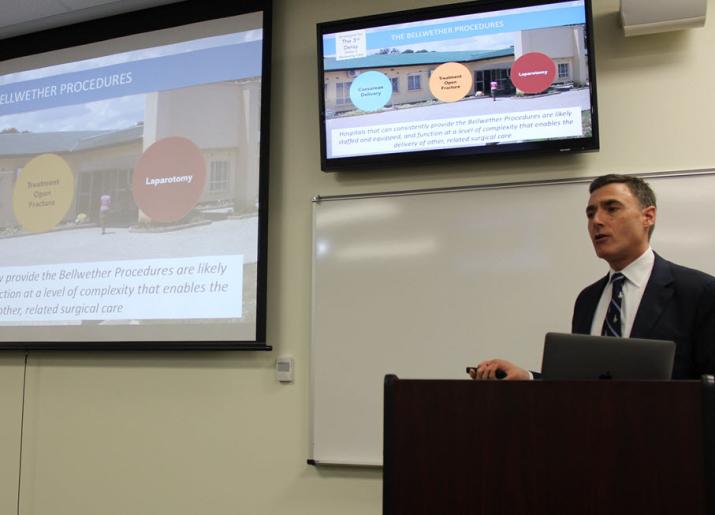
During his visit, Meara presented some of the key findings of the Lancet Commission on Global Surgery.
Published February 23, 2016, last updated on June 3, 2020 under Research News
Last week, the Duke School of Medicine and Duke Global Health Institute (DGHI) were honored to host John Meara, one of the leading forces in the global surgery movement. Meara, professor of global surgery at Harvard Medical School and chief plastic surgeon at the Boston Children’s Hospital, has spent the last two years co-leading a team to produce the Lancet Commission on Global Surgery. During his visit, he presented many of the Commission’s findings to the Duke community.
Meara presented at grand rounds at Duke Health on February 17, with hundreds of health practitioners and students in attendance. He was introduced by School of Medicine professor and DGHI affiliate faculty member Henry Rice, who shares Meara’s passion for understanding surgical need in low- and middle-income countries (LMICs).
The presentation also featured a guest appearance by global health and public policy professor Gavin Yamey, also a member of the Lancet Commission on Global Surgery. Meara also presented the Commission’s work on Global Surgery to a packed house at DGHI on February 18.
Key Messages Demonstrate Dire Need for Improved Surgery Access
During his presentation, Meara focused on the key messages of the Commission:
- Five billion people cannot access safe surgery when needed
- At least 143 million more procedures are needed annually
- In order to pay for surgery, 33 million people face catastrophic expenses each year
- Investing in surgery is affordable, saves lives and promotes economic growth
- Surgery is an indivisible, indispensable part of healthcare
Meara also outlined the process the Commission went through to yield the findings. A large team of researchers collected health and economic indicators for all countries included in the report. In addition, the international group met four times—in the United States, Sierra Leone, United Arab Emirates and Italy.
Core Indicators Established to Help Countries Identify Strengths, Weaknesses
The Commission decided on six core indicators that will help capture that status of surgical access in a country:
- Two-hour access: Percentage of population with timely access to essential surgery
- SAO/100,000: Number of surgeons, anesthesiologists and obstetricians per 100,000 people
- Surgical volume: Number of surgical procedures done in an operating room per 100,000 people per year
- Perioperative mortality: All-cause death rate after procedure and prior to discharge
- Protection against impoverishing expenditure
- Protection against catastrophic expenditure
The Commission advised that these indicators be tracked on a national level. At the last meeting in Bellagio, Italy, the crafted a National Surgery Plan, which included a set of domains that nations could use to further develop surgical access: infrastructure, workforce, service delivery, financing and information management. The Commission further outlined some ways to implement these domains.
Lancet Commissions are intended to inform and drive policy change for healthcare equity. Meara hopes that the key messages and core indicators are able to do just that. “There is very little data right now on surgery. If you look at the World Bank’s Development Indicators, there are none for surgery,” said Meara. “If you don’t measure it, you can’t manage it. Fortunately, the World Bank is now willing to publish them, but we need a lot more data.”
During his visit, Meara also listened to a variety of presentations from various Duke entities also involved in global surgery, such as those spearheaded by DGHI faculty members Michael Haglund, Catherine Staton and Henry Rice. He also served as a guest speaker for Yamey’s Global Health Policy class at DGHI with an extended interactive discussion.
Read the Lancet Commission on Global Surgery.


